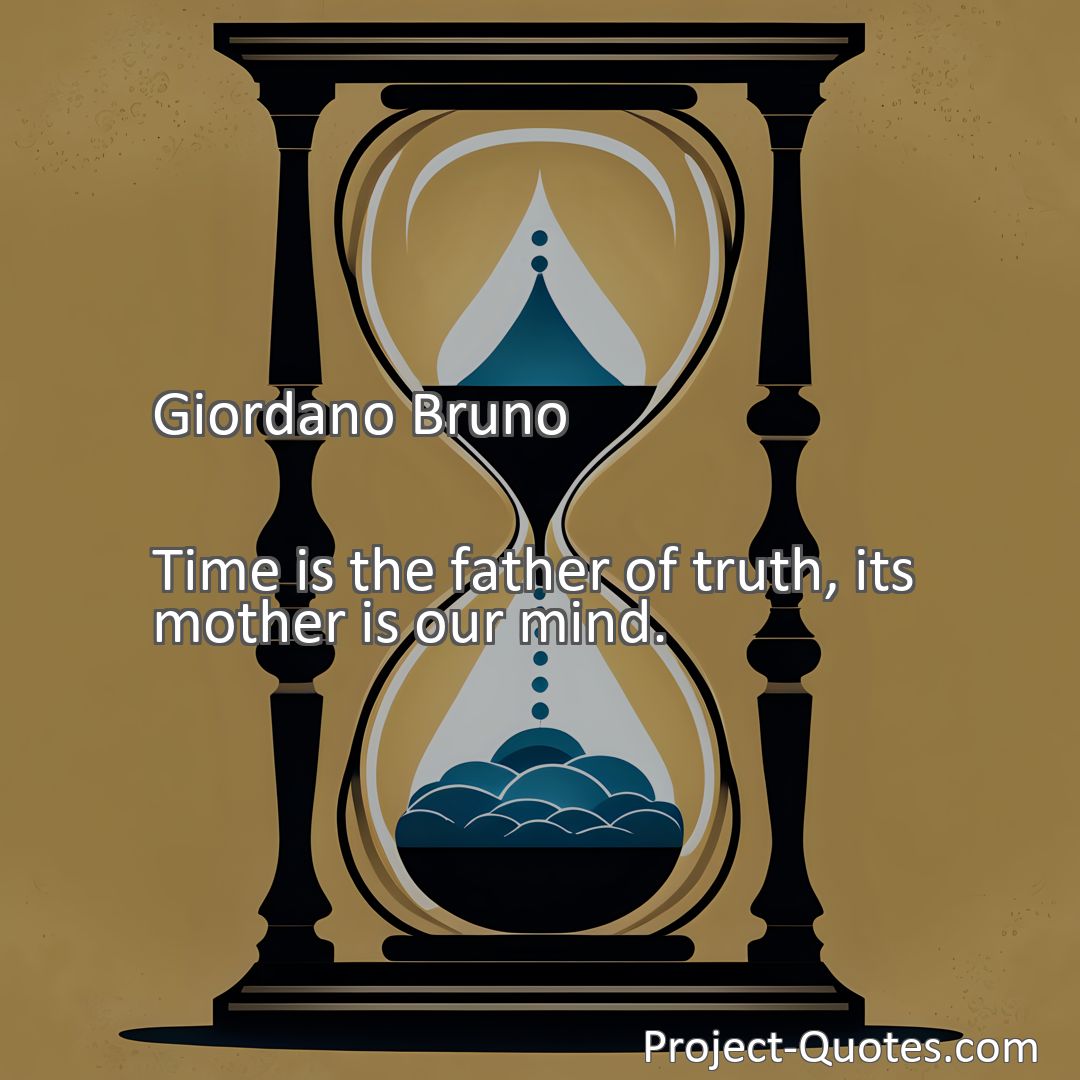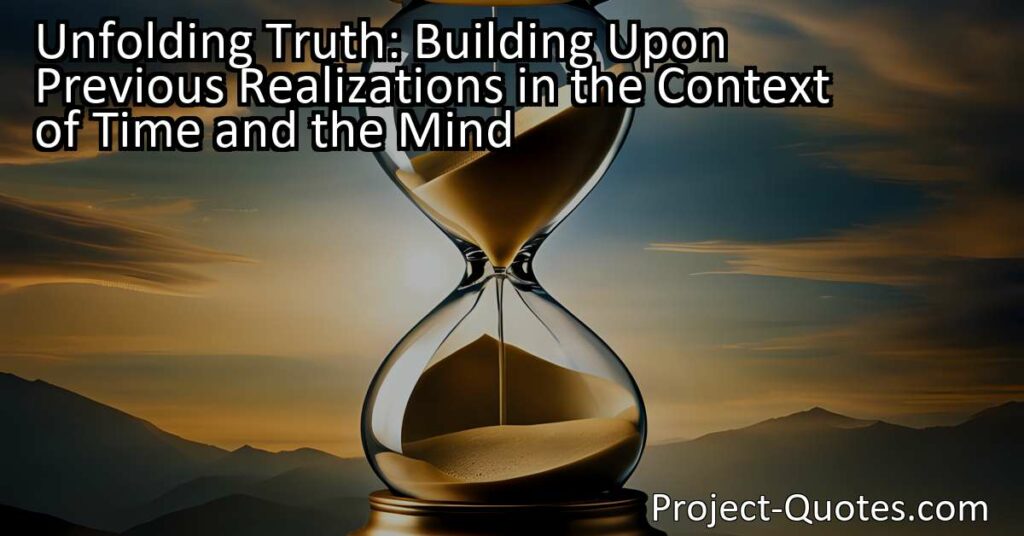Time is the father of truth, its mother is our mind.
Giordano Bruno
“Unfolding Truth: Building Upon Previous Realizations in the Context of Time and the Mind” explores the relationship between time, the mind, and the pursuit of truth. Giordano Bruno’s quote emphasizes the importance of time as the father of truth and the mind as its mother. By acknowledging the interplay between time and the mind, we can continuously refine our understanding of truth and embrace the ever-unfolding journey of knowledge.
Table of Contents
Meaning of Quote – Time is the father of truth, its mother is our mind.
The Role of Time and the Mind in Discovering Truth: Insights from Giordano Bruno
Introduction:
In our quest for truth, we often find ourselves pondering the concept of time and the workings of our own minds. Giordano Bruno, a philosopher and mathematician of the Renaissance era, sheds light on this matter with his profound quote, “Time is the father of truth, its mother is our mind.” In this essay, we will delve into the deeper meaning of this quote, exploring the intertwined relationship between time and the human mind in the pursuit of truth. Through Bruno’s perspective, we will gain insights into how the flow of time interacts with the workings of our own thoughts and perceptions.
Understanding the Significance of Time:
To grasp the essence of Bruno’s quote, we must first understand the significance of time in the search for truth. Time acts as a crucial catalyst, allowing experiences, events, and knowledge to unfold gradually. It is through the passage of time that we can observe and analyze various phenomena, enabling us to discern what is true from what is merely transient. In this sense, time can be seen as the “father” of truth, as it reveals the underlying essence of things through its steady progression.
The Role of the Mind:
Moving on to the second part of the quote, Bruno introduces the notion that the mind serves as the “mother” of truth. Here, he highlights the importance of our own cognitive processes, perceptions, and interpretations in the pursuit of truth. Our minds play a crucial role in analyzing and making sense of the information presented to us by the passage of time. It is through our thoughts, reflections, and reasoning that truth can be realized, discovered, and understood.
The Interplay of Time and the Mind:
When we consider the interplay between time and the mind, we recognize the intricate relationship they share. Time provides the canvas upon which our thoughts and experiences unfold, enabling us to gather knowledge and insight. Simultaneously, our minds act as the filters through which we perceive and process this flow of time. The experiences we gain through the passage of time shape our perception and, subsequently, our understanding of truth.
Temporal Perspectives on Truth:
As time moves forward, our perspectives on truth evolve and expand. What we regarded as true in the past may not align with our current understanding. However, this does not diminish the importance of past truths but rather highlights the dynamic nature of truth itself. Each temporal perspective offers a piece of the truth puzzle, building upon previous realizations and paving the way for new insights. It is through this continuous interaction between time and our minds that truth is not only shaped but also refined.
Perception, Bias, and Objective Truth:
Our minds, while capable of uncovering truth, are susceptible to personal biases and inherent limitations. The same flow of time can be interpreted differently by individuals due to their unique perspectives and experiences. Therefore, it is essential to recognize the role that perception plays in discerning truth. Despite our best intentions, our minds can unintentionally introduce distortions or subjective elements to the truth-seeking process. By acknowledging the potential limitations of the mind, we cultivate a more critical and open-minded approach to the pursuit of objective truth.
The Influence of Culture and Society:
The interplay between time, the mind, and truth is also intertwined with the influence of culture and society. As we go through the world, our minds are constantly influenced by the ideas, values, and beliefs that surround us. These external forces shape our perception of reality and can both assist and hinder our search for truth. It is essential to be aware of the influence of societal and cultural conditioning, as this awareness enables us to approach truth-seeking with greater discernment and objectivity.
Embracing the Journey:
In the pursuit of truth, it is crucial to recognize that truth, like time itself, is a continuous journey. Our minds evolve, our understanding expands, and our perspectives shift as we explore new territory. Embracing this ever-unfolding process allows us to appreciate the beauty of discovery and remain open to the possibility of new truths. By acknowledging the roles that time and the mind play, we find ourselves on a perpetual quest for wisdom and a deeper understanding of the world around us.
Conclusion:
Drawing from Giordano Bruno’s profound quote, we have explored the intricate relationship between time, the mind, and the quest for truth. Time acts as the father of truth, revealing its essence through the passage of experiences and the gradual unfolding of events. Simultaneously, our minds act as the mother of truth, perceiving, processing, and shaping our understanding of reality. Through the interplay of time and the mind, we gain insights, challenge biases, and embark on an unending search for deeper truths. By embracing the fluidity of truth and recognizing our own cognitive processes, we empower ourselves to navigate the complexities of the world and contribute to the ever-evolving pursuit of knowledge.
I hope this quote inspired image brings you hope and peace. Share it with someone who needs it today!


